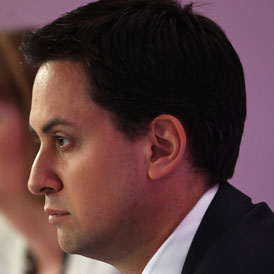Poll puts No to AV campaign ahead as referendum looms
The latest opinion poll suggests voters will reject electoral reform on Thursday. Labour leader Ed Miliband admits that defeat will force the issue off the political agenda for some time.

Voters are expected to deliver a decisive “no” to the alternative vote in Thursday’s referendum, according to the latest opinion poll.
A ComRes survey for The Independent gives the No to AV campaign a 32-point lead among people who have made up their minds and say they will definitely vote in the poll on electoral reform.
It put the No vote on 66 per cent, compared with 34 per cent for the Yes campaign – a 12-point widening of the gap since last week, when the margin was 60 per cent to 40 per cent.
The Labour leader, Ed Miliband, has made a last-minute appeal for voters not to treat the vote as a referendum on Lib Dem leader Nick Clegg, a fellow supporter of the Yes to AV campaign.
In a sign of how toxic Mr Clegg’s endorsement is perceived to be by other backers of AV, Mr Miliband said: “The reason I did not share a platform with Nick Clegg is because I didn’t want it to become what in some people’s minds I think it still is, which is a referendum on Nick Clegg and some of the promises he has broken.
“I didn’t want it to become what in some people’s minds I think it still is, which is a referendum on Nick Clegg and some of the promises he has broken.” Ed Miliband
“This isn’t about Nick Clegg. This is about whether we change our politics for the better and this is a once-in-a-generation opportunity to do it.”
He added: “This is a chance to change our political system for the better, in my view, a chance to ensure that every MP elected must seek 50 per cent of the vote, a chance to make more people’s views count and a chance to change the yah-boo political culture, because we will all have to reach out more.”
Unlike Britain’s current first-past-the-post system, where a candidate who gets the most votes wins, AV asks voters to rank candidates in order of preference, and uses second and subsequent preferences to ensure candidates can get elected only once they’ve won more than half the vote.
Read more - FactCheck: AV round-up - the truth behind the claims
Mr Miliband acknowledged that there were party political calculations behind his backing for AV, saying: “I do think there is an anti-Conservative majority in this country and I don’t think first-past-the-post gives expression to it.
“My main reasons for advocating a change are principled reasons to do with a fairer system. I also happen to believe there is a progressive majority in this country and first-past-the-post doesn’t give expression to it.”
Asked why Labour did not introduce AV during its 13 years in power, Mr Miliband said: “We had too big a majority. When a Government comes along and has a majority of 170, there is not much incentive to change the electoral system.”
He conceded that a decisive No vote would force the issue of electoral reform off the political agenda for some time, saying: “I don’t think we are going to be coming back to this very quickly.”
Cabinet clash
Mr Clegg refused to concede that defeat for AV seems likely. And he refused to comment on his Lib Dem colleague Chris Huhne’s intervention, which has been criticised by the Yes campaign yesterday as unhelpful.
Read more: Channel 4 News political editor Gary Gibbon - Coalition clashes on voting reform
Tensions between the Conservatives and their Lib Dems coalition partners erupted at a Cabinet meeting on Tuesday when the Energy Secretary confronted Prime Minister David Cameron and Chancellor George Osborne over alleged “lies” by the No camp.
Mr Clegg said: “I think temperatures of course run high in the final stages of a referendum campaign.
“At the end of the day, this isn’t about what one politician said to another, it’s not even about what one political party thinks about it, it’s what do people think when they have the chance to cast their vote at the referendum tomorrow.
“I’m not going to provide a running commentary on Cabinet. Clearly temperatures run high at this stage in the referendum campaign but the great thing about a referendum is it’s not about the politicians, it’s about what the people want.”